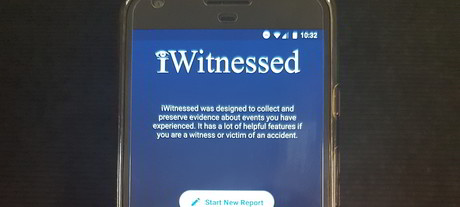Aussie apps allow faster witness reporting

The University of Sydney and ASX-listed Citadel Group have both separately developed new applications designed to allow witnesses to more quickly and rapidly report information about crimes and emergency incidents to the authorities.
The university has developed a free app named iWitnessed, developed by Australian cognitive scientists in consultation with lawyers and the police.
iWitnessed was developed by University of Sydney forensic psychology experts Dr Helen Paterson and Dr Celine van Golde as well as UNSW Sydney’s Professor Richard Kemp.
The app has been developed based on research in Australia and the UK noting that memory decays rapidly after an event but can be preserved if a full account is given within 24 hours of the incident.
Users can input information about a witnessed incident based on guided questions presented by the app, including text, images, voice and map locations. Accounts can be converted to PDF and then sent to police or any other secure email address. Information stored on the device can be protected by a PIN.
“This project places Australia at the forefront of international initiatives to improve the collection of eyewitness evidence and it will help in the investigation and prosecution of incidents,” Dr Paterson said.
“We encourage people to use iWitnessed as much as possible to make recordings and report their observations of tragic events; in cases of an emergency, however, people should immediately phone 000.”
Separately, the Citadel Group has developed a prototype app designed to enhance national security by allowing real-time reporting of potential security threats.
The smartphone app would allow users to instantly collect data including video and audio of suspicious incidents. This information could then be instantly consolidated and analysed to determine the severity of threats and allow authorities to respond as needed. The same app could then be used to push alerts to citizens and users.
“The concept for the solution can be traced back to the day of the Lindt siege terror attack when it was obvious the first responders did not have immediate access to real-time information they needed to rapidly deal with the situation. We felt we could design and develop a citizen-centric solution to make that information available and keep people safe,” Citadel CEO Darren Staley said.
“In simple terms, this turns a smartphone into an intelligence-gathering device. From a national security perspective, you see something, you’re in a bad situation, you hear an explosion. Even if you can’t tell if it was actually an explosion or just a car backfiring, you’re able to take and submit your recording. Now emergency services can see what people are seeing, hear what people are hearing and understand whether it’s a single incident or coordinated attack.”
The analytics capabilities of the system would, for example, be able to determine when there are multiple instances within close proximity to each other, which may be an indication of a coordinated attack.
“Traditionally that sort of insight may take hours to develop — this app makes it seamless,” Staley said.
Both iWitnessed and Citadel’s prototype take advantage of the GPS and location stamping functionalities of modern smartphones to determine the location of a witnessed incident.
Adapting to new cybersecurity challenges: a roadmap for Australian government agencies
Given the rise in cyber threats against government networks and critical infrastructure sectors,...
Growing fraud trends in Australian health care
As the healthcare landscape evolves, so do the methods of fraud.
Overcoming the top cybersecurity challenges faced by public agencies
With a new cybersecurity strategy out and the right approach to key challenges, the public sector...






